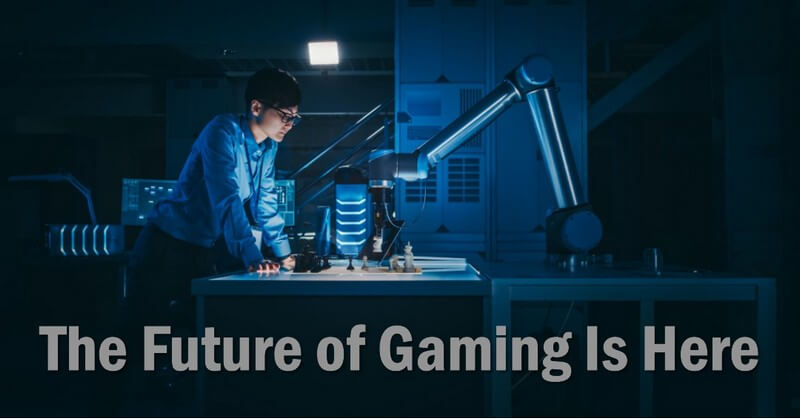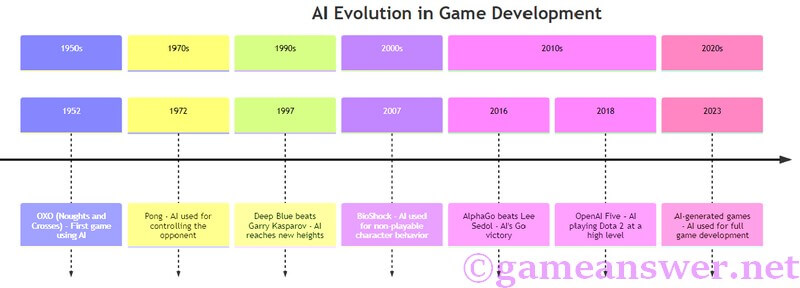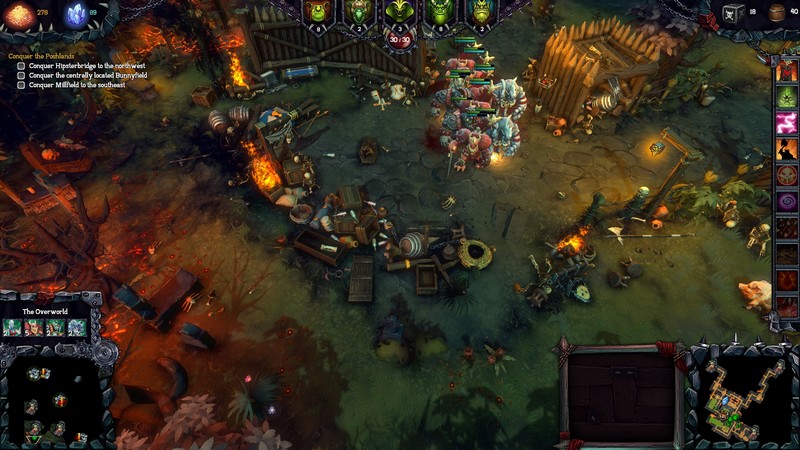
AI in game development is sparking a revolution. This powerful technology is reshaping the industry, creating a future that’s both exciting and full of promise. Far from being just a tool or an opponent in a game, AI is emerging as a master game developer. It’s crafting intricate game worlds and creating adaptive gameplay experiences that push the boundaries of what’s possible.
So, ready your gear, fellow adventurers! We’re about to embark on an epic quest to uncover the role of AI in the future of game development. Prepare to be captivated, enlightened, and maybe even pleasantly surprised by what the future holds.. Let the game begin!
Table of Contents :
The Evolution of AI in Gaming:
The use of AI in gaming has evolved significantly over the years. From its humble beginnings in simple games like Pong and Space Invaders, AI has become an indispensable part of the gaming experience.
The Early Days of AI in Gaming:
AI was actively employed in the initial stages to develop rudimentary Non-Player Character (NPC) behaviors and straightforward decision-making processes. During this period, AI systems primarily relied on rule-based approaches, wherein they adhered to predetermined rules when making decisions.
Advancements in AI Techniques:
As technology progressed, so did the complexity of AI in games. New techniques such as pathfinding, decision trees, and state machines were introduced, leading to improved NPC behaviors and increased game complexity. These advancements allowed for a more immersive and challenging gaming experience.
Machine Learning Enters the Scene:
The introduction of machine learning marked a significant turning point in the use of AI in gaming. Machine learning algorithms can learn from data, which allows them to make more informed decisions than rule-based AI systems. This has led to the development of more sophisticated AI systems that can play games at a superhuman level.
The Current State of AI in Gaming:
Today, AI in gaming has reached unprecedented levels of sophistication. Advanced techniques such as deep learning and reinforcement learning are used to create more realistic and immersive gaming experiences. These techniques allow for dynamic and adaptive gameplay, providing players with unique and personalized experiences.
Looking Ahead: The Future of AI in Gaming:
As we look to the future, it’s clear that AI will continue to play a pivotal role in the gaming industry. Emerging trends such as AI-driven game design, the use of AI in virtual reality games, and personalized gaming experiences powered by AI, point to an exciting future full of possibilities.

The Impact of AI on Game Development:
Artificial Intelligence (AI) is no longer a futuristic concept in game development. It’s here, and it’s making a significant impact. By pushing the boundaries of what’s possible, AI is ushering in a new era of creativity and innovation in game development.
How AI is Changing the Way Games are Developed:
AI is revolutionizing the game development process in several ways. Here are a few examples:
Level Generation
- No Man’s Sky: Uses AI to dynamically generate new levels while you play
NPC Behavior
- Grand Theft Auto 5: Has sophisticated pedestrian AI that reacts in different and realistic ways to the player’s actions
- Star Wars: Republic Commando: Has AI that can trivialize threats that can cause major problems for the player
- Red Dead Redemption 2: Is known for its advanced NPC behavior and aggressive enemy AI

Storytelling
- Dungeon 2: Uses an OpenAI-developed, open-source text generation technology trained on Choose Your Own Adventure novels
- Rimworld: Uses AI to tell procedurally-generated stories through its AI story generator

Bots
- Unreal Tournament: Features good AI bots that rely on strategies instead of pure brute force to win games
Learning AI
- Left 4 Dead: Has AI zombies that react realistically depending on where they’re hit
- Alien: Isolation: The AI in this game learns from its behavior and the player’s actions
Other
- FIFA: The ultimate team mode in FIFA uses AI to calculate a team chemistry score based on the players’ personalities
- SEED (EA): The company uses AI to train NPC characters through imitation
- Half-Life: Demonstrated the importance of AI in video games with impressive AI troopers who try to outsmart the player
- Bioshock Infinite: Is known for mastering companion AI with the character Elizabeth

The Future of AI in Game Development:
AI is no longer a novelty in game development, but a necessity. As AI technology continues to evolve, we can expect even more exciting developments in the gaming world. For example, AI could be used to create games that are tailored to the individual player’s preferences, or to generate new game content on demand. The possibilities are endless.
Ethical Considerations :
As we continue to explore the vast potential of AI in game development, it’s crucial to also consider the ethical implications. The integration of AI in gaming isn’t just about technological advancement; it’s also about balancing this progress with ethical responsibility.
1. Privacy and Data Security
AI systems often rely on large amounts of data to function effectively. In gaming, this could include data on player behavior, preferences, and even personal information. It’s essential to ensure that this data is collected, stored, and used in a way that respects the privacy and security of players.
2. Fairness and Bias
AI systems can unintentionally perpetuate existing biases if they’re trained on biased data. In the context of gaming, this could lead to unfair gameplay or discriminatory practices. Game developers must be vigilant in checking for and mitigating any biases in their AI systems.
3. Transparency and Accountability
As AI systems become more complex, it can be challenging to understand how they make certain decisions. This lack of transparency can be problematic, particularly when those decisions have significant consequences. Game developers must strive for transparency in their AI systems and be accountable for their outcomes.
4. The Impact on Jobs
The use of AI in game development could potentially lead to job losses, as tasks previously done by humans are automated. It’s important to consider how to balance the benefits of AI with its potential impact on employment within the industry.
5. The Influence on Player Behavior
AI can significantly influence player behavior, particularly when used to personalize gaming experiences. While this can enhance engagement, it also raises ethical questions about manipulation and the potential for addiction.
Final thoughts:
In conclusion, the use of AI in game development offers exciting possibilities, from reshaping how games are developed to providing players with unique and personalized experiences. But as we push the boundaries of what’s possible with AI, we must also ensure we’re doing so responsibly, taking into account privacy, fairness, transparency, and the potential impact on jobs and player behavior.